Selective Focus: Aaron Reichow’s Duluth Music Scene Photos
Aaron Reichow started taking photos of the Duluth music scene around 2014 when one of his favorite bands, Low, was doing a residency at Fitger’s Brewhouse. The band’s music got him through “a lot of periods of my life,” Reichow said. Low was set to play all of their songs in a random order across several Thursdays around the same time Reichow’s youngest child was starting to sleep through the night. “In my marriage, I did most of the child care, all the bedtimes,” he described. “And when they started to get older, I thought ‘well, I can go out again without feeling guilty.’” A practice in photography helped him reclaim the intention of going out again. And with time, his hobby turned into a professional art form. Read more about his work in the interview below.
Is going out more exciting or comforting for you when you have your camera in hand?
Yeah, I don’t really know what to do otherwise? So I went to Low. And I went to every single one. And after that, I just kept going to shows. And there’s something to me about having a camera and having a job that helps justify my existence in a place. I struggled a lot with a sort of feeling that I was going to a show alone. I wasn’t going with friends. I felt like I was walking into someone else’s scene. I don’t think I would have gone to shows anywhere as near as much as I did without this job to sort of hide behind.
I think it’s really clear that you love this community a lot. There’s an amount of joy in just seeing the people that are there that comes out in a lot of your photos. I know that as someone who can be a bit introverted and as a neurodivergent person, that if I go out in a mission-oriented way it can be more comfortable. Sometimes when I go out I’m thinking “how can I plug artists or musicians in further?
I just like having something to do. Same if I got to a party. If it’s a friend’s party, I’d rather have some type of job. Like if someone said “make sure the salsa is full.” It gives me certainty. Otherwise, I feel like I’m not anchored to anything.
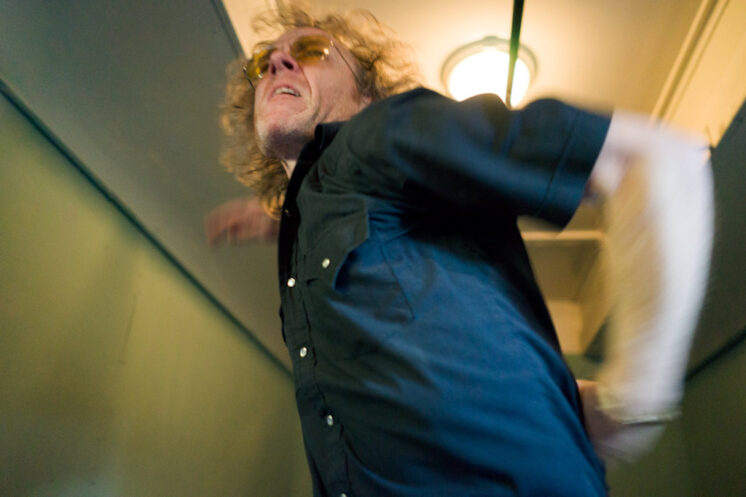
“Chickenbone George” Alan Sparhawk of the Black-eyed Snakes during the Blood on the Tracks Express adventure at the Duluth Depot.
And you do an amazing job! Are there specific camera lenses that you like to bring while you’re shooting that you like to stick to? Are you mostly shooting in digital?
Yeah, pretty much everything in digital. Sometimes I’ll shoot something in film for fun. Especially with music because, you know, it’s dark. It’s hard to do good film photography in the settings that I do, for the most part. At least not without sacrificing a certain amount of quality and spending a lot more time and money. […]
I only use manual focus lenses. On Sony, when on a full frame camera, I use basically a bunch of old film lenses because you can buy these adapters really cheap. All it is is a metal tube to put the lens the right distance, you know? And it was cheap. Like when I started, maybe in 2012, I bought an interchangeable lens camera. My younger son was maybe about a year old. And looking at the photos from my first kid from that period of his life, I was like, ‘God, I have so many shitty photos’ where I didn’t capture the thing I wanted to capture.
So I [bought] a real camera. it wasn’t a DSLR, but a mirrorless, with an interchangeable lens thing. And then, manual focus lenses were cheap. It scratched some kind of itch to be able to buy lenses that were $20 to $50 instead of hundreds of dollars. […]
This lens is probably one of my favorites. I use a lot of these, there’s a couple brands, 7Artisans and TTArtisans. They’re these small Chinese companies that make manual focus, like fully manual lenses, you know, manual aperture and everything. That basically work like an old film lens and have a lot of the flaws [that film lenses have]. […] [But] Fuji lenses made for the camera… they just look boring somehow. I just haven’t really clicked with autofocus. When I started using the Fuji during the pandemic, I ended up switching to [Fuji] over from my Sony. Because I wanted a smaller camera mostly for around the house.
[…] And I just didn’t get along with any of them. For whatever reason, the autofocus is a pain. […] I think in that way, [through the manual lenses] and see in that way. […] When you use the same lenses a lot, you get an intuitive sense.
Watching you shoot at events, it seems like you’re really good at fluidly switching between your lenses and adapting very quickly.
Yeah, I don’t have any zooms and so I’m always using primes. […] Where it’s just one focal length. And I feel like I have these, you know, they call them frame lines. In my head, I can see a couple steps. But with a zoom lens? I’m like “I don’t know.”
I totally get that. So, you’ve displayed your photos at Blush while it was there. And included them in other publications. Where are some other places your photos have ended up?
I’ve had a handful of shows. I’ve had a solo show at the Red Herring around 2018. The one at Blush around 2022. One at the DECC this last year.
So, your first one was at the Red Herring.
And the Red Herring approached me about that. […] I come out of a technical background. I’ve always been a computer nerd or things like that. It took me a long time to think of myself as an artist. And not a technician, or a guy with a camera.
I think the way you’re focused on and interested in [photography] is really cool. And how you engage with the community directly through that interest. And how much you know about the technicalities. I think it can take some people a long time to learn those things or bog them down, but it seems like you have a genuine excitement to learn that part.
Yeah, where that’s definitely the easy thing. Rather than somehow the artistic part. That came more over time.
Have you ever gained any mentorship, training or schooling, or are you self-taught?
No, I’m self-taught. There’s a lot where I just didn’t know how it worked. When the Red Herring approached me to put on a show, that was the last show I had until that day at Blush the March before Homegrown that year. […] I just was, like, ‘What are your art plans?’ And it literally never occurred to me that I was supposed to ask.
Do you think there has been a benefit to being self-taught? That you’ve found any aspect of being self-taught to be an asset? Verses having learned in a more structured setting?
I feel like I don’t really know the other side of it. I think that there probably comes some kind of, I don’t know, this is going to sound overwrought, but some purity of vision.
Like, if you’re a musician, right. And you’re really steeped in all the other contemporary music. You end up using other people’s chord progressions. Or you end up second-guessing that. […] I think a lot of art is, like, this dialectical thing. I think sometimes somebody like me ends up outside of it and that has negatives and positives. I think it certainly helped me to be forced to develop my own sort of vision for it. And my own idiosyncratic style-type things, rather than try to match what I thought people liked or something.
Do you think that your vision for it kind of became organic and developed over time, or did you kind of always just see yourself shooting the music scene?
It definitely developed over time. But […] I think a lot of my photography has a consistent vision or style to it that ultimately is grounded in my candid photos of my kids. Where I developed an ability to sort of watch and read for the moment and watch for the interesting things. I practiced a lot of that, really, on my kids. And […] you get, like, this intuitive sense of like [when] something interesting is going to happen. You know what I mean?
So you started with family photography, and it emerged from there.
Oh, totally. And, even just the way my photos are […] I’ve seen, like, diagrams where they draw, compositional diagrams of breaking a photo down.[…] The type of blocking I use, and it’s a very different subject matter. But, it took time to sort of emerge, I think.
I’ve noticed a lot of your photography has been centered at DIY shows, or underground music spaces. And I know you did a lot of photography at Blush. Is my awareness of that more just because I pay attention to those spaces more, or do you think you also have more of a focus or niche there, too?
I think that’s accurate, yeah. I’m generally pretty uninterested in shooting music where I can’t be up close. […] I’m just not tuned in to a lot of larger music trends. […] There’s a lot of classic albums, depending on how one defines it for the last 50 years, that I feel like I’ve never listened to. […] And I just end up getting drawn to what I can engage with in the way I like, which is to be able to take pictures. And being able to take pictures where I’m up close.
Like, I love to be in a crowded room. […] In some ways it gives me this excuse to be really close without feeling obnoxious. […] In a place like Blush, you’re always close. So I may as well be up front taking pictures from here, instead of feeling socially obnoxious and sort of hiding in a corner. I’m still going to be in this press of people, and still kind of in the way to everybody, [but] we’re all in each other’s way. […] Like, I’m looking in on other people’s community or other people’s scene.
It’s interesting to hear you describe yourself as being on the outside because your photos look so much like on the inside. Does that end up being an interesting duality for you?
I mean, there’s like a tension in there for me. […] At some point I would have said I think there’s something inherent to being a photographer, which is like, you’re on the outside looking in. And I’ve come to realize maybe that’s the way I am built or the way I feel, but it’s maybe not inherent.
[…] And some of the places that you’ve spent the most time taking photos are no longer open. The Red Herring closed. Blush has closed. The Salty Dogs’ house has been demoed, with a show you caught there right beforehand. Through your lens as a photographer, what did you notice or feel about some of those spaces closing? Are there things you miss about them? As […] different things changed the city?
The thing I miss the most about the Red Herring or Blush is that they brought in […] these big bands for a small market. Where at some point [bands] start touring regionally. And what I’ve found is that almost all those bands are worth checking out, for anyone. If you can get your shit together enough to coordinate everything with the band at a venue and pack your stuff up and drive three to ten hours to some other town and put on a show. Almost always, it’s pretty good stuff that’s worth seeing. And it’s something interesting that’s different than what we have. I miss that a lot with both of them. Because both the Red Herring and Blush had bookers or, you know, whoever, with the connections to bring those things in. I’ve seen a lot of music at those two particular venues that I just never would have otherwise seen without living in Green Bay, or Milwaukee, or wherever. It’s like the best of these local scenes. They’re the people who leave town to go play […] a little tour somewhere. And I don’t know if we really have that right now.
And you also caught some of Sub Superior last year. And some of those other more experimental performance spaces. Are then you were in the Sacred Heart Homegrown show that Troy Rogers curated. Is there anything that has struck you really important or excited you to photograph or be involved in those spaces?
The thing that I really was excited by with the Sacred Heart robot mass thing is that Troy has a vision. I don’t know a lot of what Troy does — I’m like, ‘I want to be around this’ — because it seems pretty cool.
How was the experience of being a participant in one of the shows versus being behind a camera lens?
It was the first time I’d ever been in some kind of Homegrown event or any event, really. I love to sing. I was in choirs for a long time. Mostly, like, as a kid. Church choirs, specifically. And it was really special to have something like that I could really be involved in.
And it was also sort of frustrating. That was such a visually awesome thing that I would have definitely been an event for me to go to to take pictures. And I would have been really excited.
That double part of love being involved in but also wanting to take pictures totally makes sense.
And I had a camera with me. And even got one or two photos that I snuck to get in. But I also […] had to come to terms with, or find peace with just being a performer in it. And I think that the experience was better than if I tried to split my attention too much.
It’s almost like you are in this community, too.
No, no. I needed that. Thank you.
This seems like a huge passion or hobby that you enjoy. But it also feels like you’re doing such a huge service for the community all of the time. Have you been able to sell your prints, or are you trying to do that more? Are you hoping to book or have more paid gigs? Do you contextualize those a little differently?
That’s sort of been another area of tension. […] Especially the last couple years, everything ends up being a big story. […] But at this point, I go to more shows, and see more music, and take more pictures than I really have time to go through. And the way it’s sort of shaken out is that if I’m hired, really kind of what you’re buying is a deadline. And paying for me to sit at the computer and get this done and given to you within two weeks instead of when I feel like it. […] It felt complicated, or I could see this hazard of feeling like I would owe it to somebody. I would owe it to a band or to somebody to sort post pictures within a certain amount of time. […] I would feel resentful if I fell into a dynamic like that. And I don’t want that, because if I start feeling that way, I’ll just stop doing it. It would pull me away from it.
That makes sense. It sounds like you have a lot to manage […] and to keep it in a space that feels really good.
I pretty much always want to take pictures. It’s just a big part of how I enjoy music, even. I get into this kind of sensual, analytical mindset, where I’m taking in and stock of the room and watching the crowd and trying to read what’s going on. I like all that stuff, and it pulls me into it. […] After spending eight hours at the computer for my day job, the last thing I want to do is go sit at the computer for another four hours at the end of the day.
I feel like I’ve got more and more paid work over time, especially the last year. […] The perfect situation for me is if somebody comes to me after like ‘I like those photos, can I license them or buy them?’ Because then I sort of get it both ways, which I get this joy of having done it for my art […] and have motivation to get the photos done.
Is there anything about your photography you’d like to share and haven’t yet?
I’d really love to sell prints, but am […] figuring it out. Or figured out a model for it. […] I need a website, where you can just click [and purchase a photo].
And especially because I wasn’t a recipient of mentorship, or I didn’t have friends to show me the ropes, I’d like to be that for other people. Or to have a group of people. Certainly, that would make me feel like we have more of a community. I have a foot in both this music world and a foot on the outside of it. Where they get together to practice music, and I go home and sit alone at a computer. I have no motivation to go do that. I really wish I had a group of people to look at each others’ images and critique them and encourage each other.
I’ve noticed that with my neurodivergence, or how my brain works, I don’t find that doing the art is challenging, but presenting it and making it fit into the structural models we’re presented with is challenging. And that it can be hard not to get more support from people in the way I need.
I think clearly that the architecture of my brain is very much reflected in how I do what I do, and uniquely or specifically enables it.
Anything else you’d like to share? About your photos, or observances you’ve had through your camera?
I really want to move toward like … right before Blush closed. […] I’ve been feeling like social media is a dead end in every way. There was no emotional content to posting a collection of photos. No exchange or connection. And [about] getting likes. It just felt stupid, or like throwing passion into a void. Where all the meaningful connection I had with photography was all in person, even if it was related to what I posted. […]
I had this moment the night of Homegrown at Blush. Jacob [from New Salty Dog] and I were talking and he was like, “you should just do like four shows a year.” […] I felt like this euphoric release of the tension that had built up over the question for me. […] That’s certainly a lot of what keeps me.
And then enough photos get stolen. [Aaron describes large, local publications and organizations that used photos without permission] I had a magazine cover without … anything. It was really exciting, but.
Yeah, that’s not proper journalistic practice to use a photo on a magazine cover in that way. And to not credit the photographer. I’m sorry that happened.
And you know, the quality wasn’t very high. And you know, it could have been a lot nicer [had I been able to send them the photo]. I’ve had some experiences like that, and they’ve been hard. […] And I’m sure it is due to incentives or pressures around budgets. […] They used to have [larger staffs] of photographers, who all knew how this works, and even those photographers were probably policing the use of other photos and being like “Hey, who shot that? Who did that? That’s pretty good.”
I think there’s this idea of the internet that sometimes you can just take whatever you want and use it however you want.
Yeah, that’s part of what feels so silly about social media to me. I even consider using watermarks or stuff like that, but then it just looks ugly. [Aaron describes more instances of finding his photos on other publications without any photo credit, including one just that night at dinner.] And it’s hard that my photos are good enough to use, but not enough for anyone to ask. I haven’t had a conversation with any of [these organizations]. Or tickets or access or an exchange. So, it feels really icky.
Yeah, that is really icky and not okay. And I could imagine it would add to the feeling of being on the outside in a way that’s not deserved. Because they should have checked in or credited you.
Yeah, it can feel like there’s “that world” and I’m not in it. And it can make me feel irrelevant. “We can do a search and take whatever we want.” And removes a lot of motivation to put in hours to process a set or something. […] And it’s a bummer, but it’s often people that I feel like would know better.
Do you have a photo with your vest? The fancy one with the felt lining safe for those fast lens swaps!
[Aaron laughed] There’s something about really having a uniform like that. It gives me permission to again, like get into peoples’ way. […]
One thing that I didn’t talk about, in the personal artwork aspect of this. […] An outcome of getting divorced or working through boundaries and codependency things has been that […] I really choose [my] obligations. I feel a strong duty or mission to capture or document the Duluth music scene. It just feels like somebody should. And sometimes I daydream of somebody else coming up, and who is more aggressive than me. And getting out more [photos], and being like “I bless you. I pass on the torch.”
You know what I mean? Not that I’m eager to be done.
Yeah. That it’s important to you that it continues to be captured in some way.
It feels important that somebody does.
I think it’s fun capturing each other at opposite events sometimes. And if I see you with your camera, I sometimes put my camera away like “oh, maybe I don’t need to take pictures. Aaron is here!” Or taking turns having it in hand.
I think I said this the other night, but I really love sort of informal collegial relationships like that.
And it sounds like you’re desiring more of that community in a more intentional way.
Even if … I wish I had more people to talk [about] photography. It’s easy to find people to talk about gear. I love to talk about that part of it if you ask my opinions, but it’s not the important part.
Are there moments you’ve witnessed at a show that have been very dear to you? I’m sure there have been several, but maybe one that’s been recent or stuck out?
Gosh, I mean probably. I don’t know. [Aaron ponders].
It looked like the last Salty Dog house show was really emotional.
I sobbed through like a whole song. It was great. [“Boss Mama” Colleen Myhre] played what I think of as [my partner] Audrey’s [favorite] song. And I had never heard anyone cover this song before, but it’s a little country song. I wasn’t ready for it, and I just cried the whole time. I mean, it was great. It was awesome. I cried enough that people asked if I was okay afterward.
I’ll think about some other [moments]. I often feel like I see moments that just slipped by everyone else. Like these moments of human contact between people. I love that a lot. Just watching this story kind of happen.
And you’ve mentioned how those in-person moments meant a lot to you. How Facebook and social media are a “lot of likes” but that the in-person moments really fill you up. Are there any others you’d like to share?
Well, I don’t know how to articulate our interactions. The one at the Lower Chester Park show. It just meant a lot to me to be seen like that. And then some of the things are like… I wish I had a file where I wrote a bunch of those. So that I can remind myself. One time Clancy [Ward] introduced me to someone as a professional photographer. And I was like “well, not really,” and he said something like “I’ve seen the way that you change lenses. You’re a professional.” And that was really powerful to me.
Because I’m not in a room with photographers, it can feel like what I do is invisible or something. It meant a lot to me that somebody noticed that. […]
Sometime in the pandemic, I ran into Nat Harvey and they said something like “it’s not a Duluth show unless Aaron is here.” And that felt really good. There was another musician […] that looked up and said something like “I looked up and saw it was Aaron. So I knew I could just completely ignore him.” Like that he could do his thing, without worrying I would be in his way.
And honestly that was like the largest compliment in the world. That somebody could trust me, especially because I like to get in there. I love the dance of it. Knowing “well, at this part of the song they always do this,” and being ready for it.
I think describing it as a dance is really beautiful.
When I’m really in it, I feel like it’s like me and this band doing this together.
And I think you’ve demonstrated to the community how trustworthy you are to hold that space in a way that is mutually collaborative and wonderful.
Yeah. Thank you.
Aaron Reichow’s annual Homegrown Music Festival photography show will be on display at Karpeles Manuscript Library Museum during the festival and throughout the months of May and June. More of his photos can be viewed on Instagram at @reichowphoto and on the Aaron Reichow Photographer Facebook page.
Recommended Links:
Leave a Comment
Only registered members can post a comment , Login / Register Here


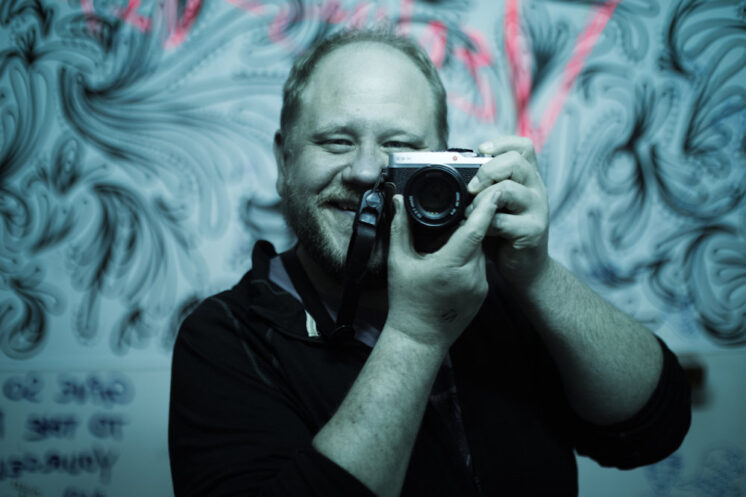
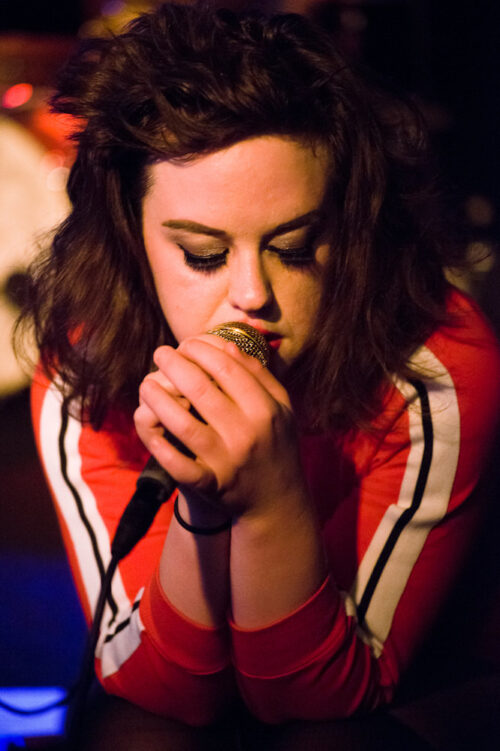
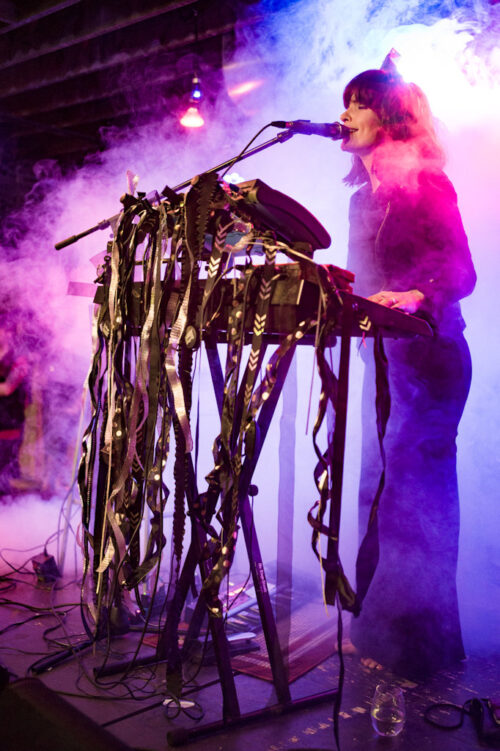
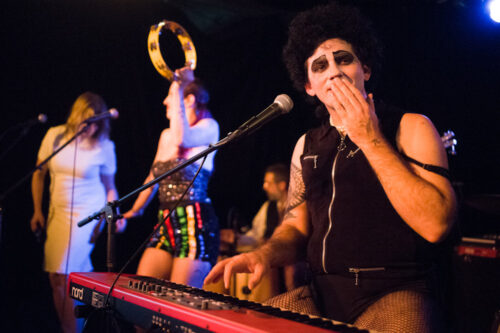
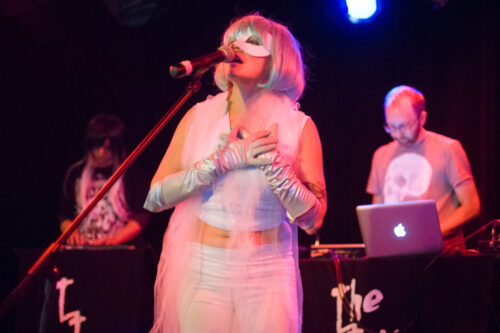
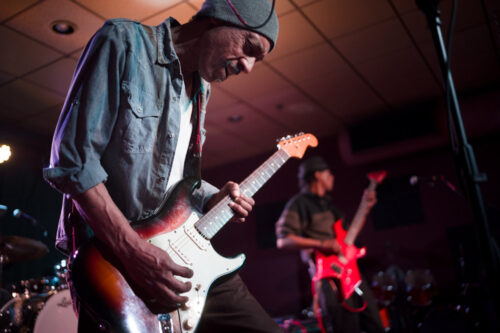
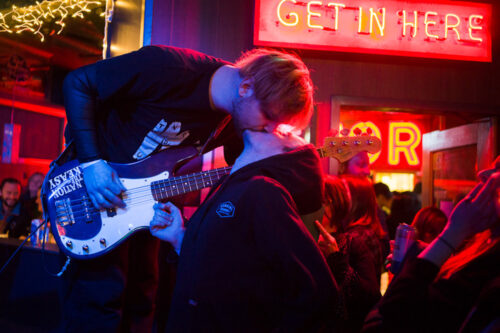
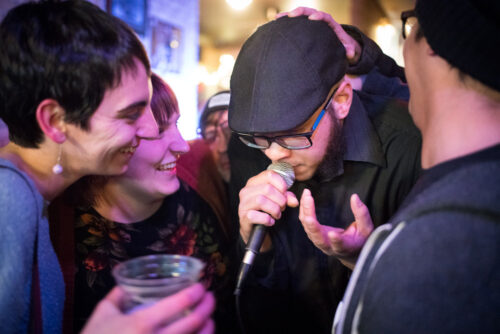
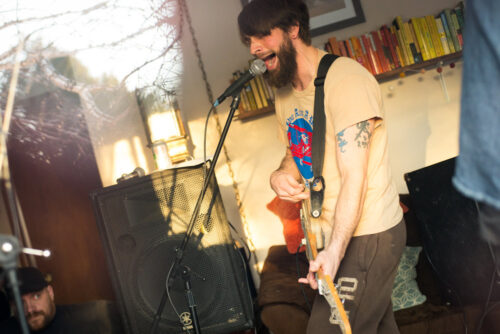
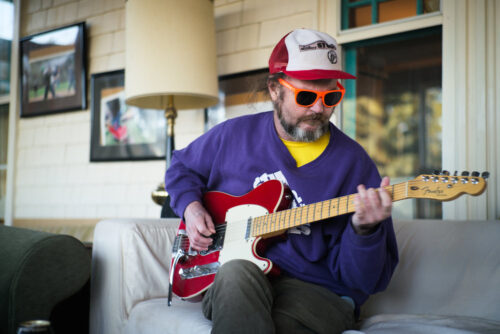
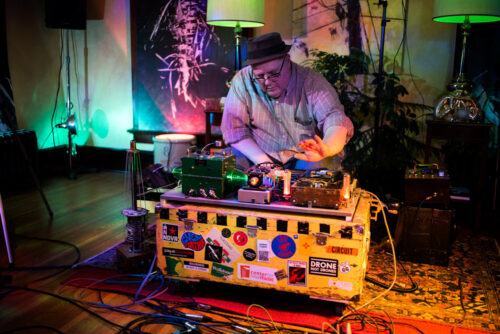
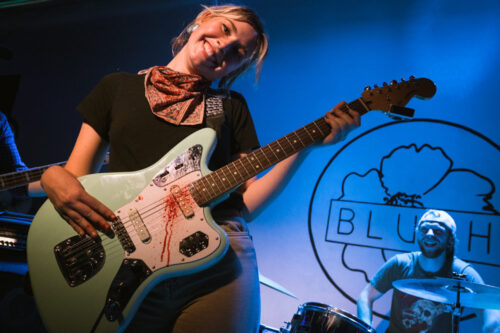
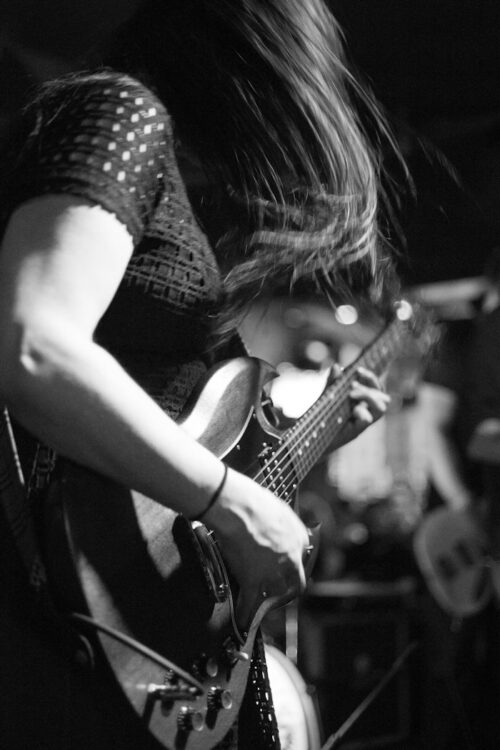
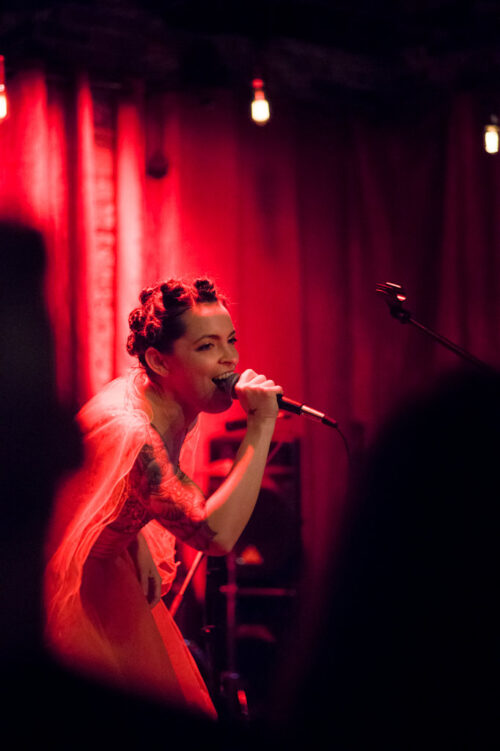
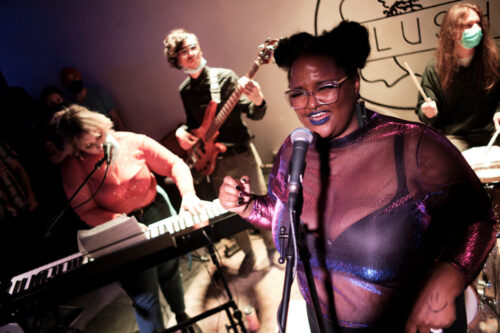
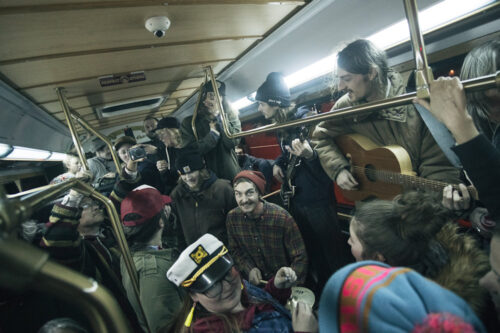
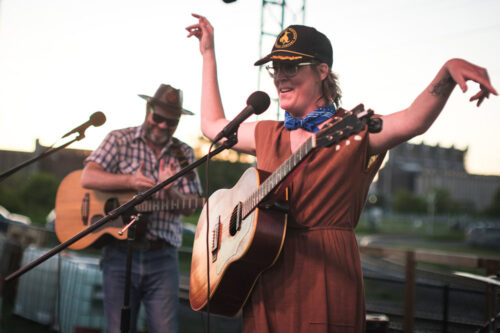
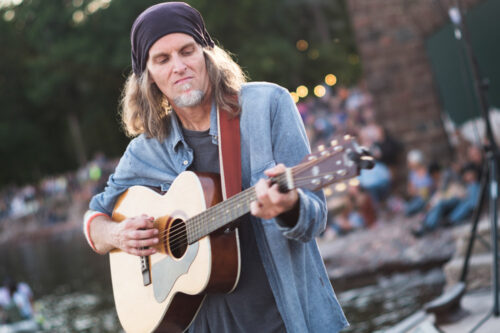
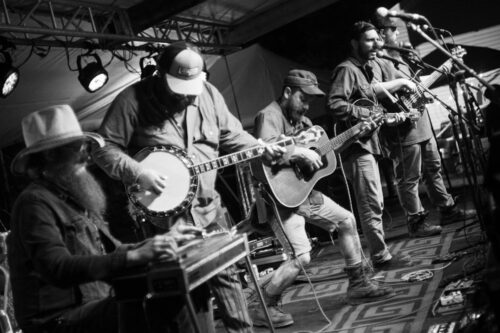
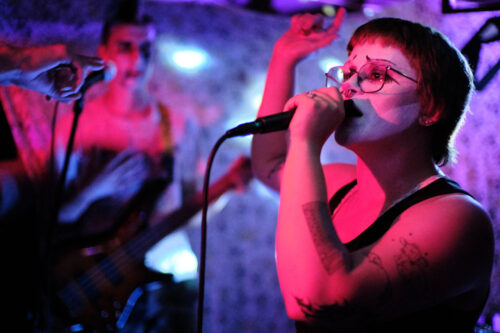
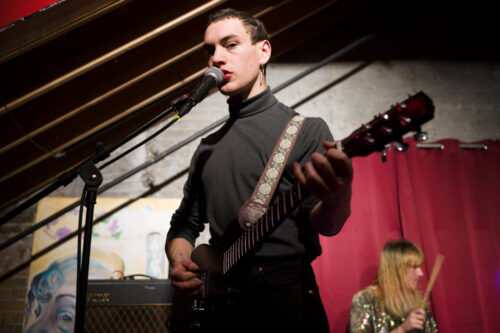

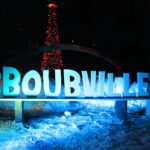
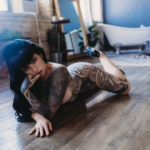
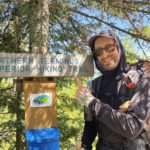

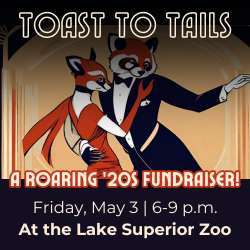

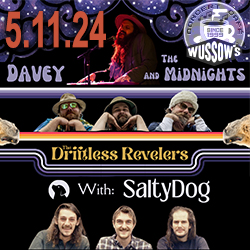

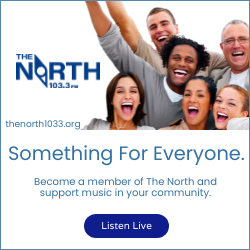
No Comments